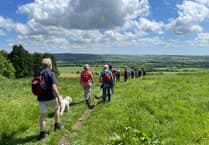BOHUNT School hosted the formal launch of LifeLines, a new educational programme created by Hampshire and Isle of Wight Air Ambulance in conjunction with Winchester Science Centre.
The launch was attended by charity trustee Sir John Day, chief executive Alex Lochrane and Bohunt School headteacher Neil Strowger.
The UK currently has a shortage of students pursuing science, technology, engineering and mathematics (STEM) careers. A study commissioned by the Royal Academy of Engineering found British industry will need 100,000 new graduates in STEM subjects every year until 2020 – just to maintain current employment numbers.
LifeLines is aiming to inspire students to pursue STEM subjects such as aviation, medical innovation, physics, mathematics and engineering.
By highlighting the day-to-day activities of the county’s air ambulance critical care team, the skills they need to do their job and the technical aspects of the helicopter, LifeLines is offering young people an understanding of real world applications in STEM subjects.
Mr Strowger, who is also chief executive of Bohunt Education Trust (BET), told The Herald: “We are really proud of our innovative STEM focused curriculum and we are delighted to have hosted the launch of LifeLines, which will support young people across the region to develop team work, creativity and other key skills required for a career in STEM.
“The programme is an excellent way to breakdown stereotypes associated with STEM careers.”
The school’s head of STEM Stratianna Davi, said: “We live in a highly scientific and technological world and our students, who will be the future citizens, need to be able to adapt, to understand science, to be committed to lifelong learning and to be competitive in the globalised market.
“At Bohunt, we are committed to a STEM curriculum and the air ambulance LifeLines programme is a great opportunity for us to achieve this”.
By providing resources and activities that motivate and inspire, LifeLines aims to bring STEM learning to life in schools and youth groups across Hampshire.
Classroom projects developed by the Hampshire and Isle of Wight Air Ambulance critical care team link directly to the key stage three curriculum, with a mission planning project testing pupil’s knowledge of mathematics and science and a lung trauma task bringing the biology element to life.
Bohunt students as well as pupils from The Petersfield School and The Priory – all run by BET – were able to participate in aircraft preparation, mission planning, critical emergency care as well as activities, organised by Emily Thorpe-Smith, from Winchester Science Centre, which has more than 170,000 visitors a year and exhibits items from the International Space Station.
Dr Ben Siggers of the air ambulance team recalled 80 emergency call-outs during September alone, with costs of running the helicopter at around £4.5m a year, amounting to £9,000 per day, mostly founded by the National Lottery, plus other non-Government income streams.
He champions awareness and basic life support skills for young people from an early age.
Molly Reckard, one of the first students in Bohunt’s new sixth form, is aiming for a career in medicine and found the LifeLines launch extremely interesting and beneficial.
Hampshire and Isle of Wight Air Ambulance schools and youth co-ordinator, Joanna Hennessey told The Herald: “The very nature of the day to day work of the critical care team creates multiple learning opportunities to inspire young people in STEM subjects and future careers. These young people are the critical care teams or helicopter engineers of the future.
“Our pilots, doctors and paramedics are fantastic role-models for our future generation. What better way to inspire young people than to introduce them to our life-saving crew, who have professionalism, openness, dedication and team work at the heart of everything they do.
“The new campaign has taken over a year to put together, is STEM-related and aims to encourage young people’s development and learning. It’s about raising awareness, creating future doctors, engineers and care teams and it is open to all young people between the ages of 11 and 18.”
LifeLines will also encourage young people to develop life skills that will help to prepare them for the future, such as communication, teamwork and problem solving.
Young people will be able to take part in the ‘LifeLines Challenge’, a four-step scheme that begins with a one-hour interactive presentation by the charity and culminates in a visit to the air ambulance’s base at Thruxton, near Andover.
To complete the challenge, participants will be asked to create a short video about the work of the air ambulance and to undertake a fundraising project in their lcommunity.
Prior to the summer launch, the LifeLines programme has been trialled in schools, colleges and groups across the county.
The launch follows the success of the charity’s ‘Be a 999 Hero’ education programme designed to teach children aged three to 11 about how to respond in an emergency and to highlight the importance of the air ambulance and other emergency services, which has now reached over 35,000 children across Hampshire and the Isle of Wight.
* Hampshire and Isle of Wight Air Ambulance delivers an advanced critical care team to the sick and injured – both day and night – 365 days a year. The air ambulance is called out on average two to three times a day to attend to road traffic collisions, sporting accidents, collapses and many other incidents, and can be anywhere within Hampshire in 15 minutes and anywhere on the Isle of Wight within 20 minutes.




